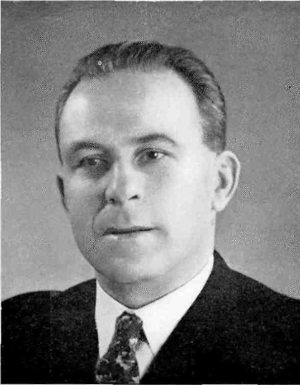Omer Becu
( Trade unionist) | ||||||||||||||||||||||||||||||
|---|---|---|---|---|---|---|---|---|---|---|---|---|---|---|---|---|---|---|---|---|---|---|---|---|---|---|---|---|---|---|
 | ||||||||||||||||||||||||||||||
| Born | 21 August 1902 Oostende, Belgium | |||||||||||||||||||||||||||||
| Died | 9 October 1982 (Age 80) Antwerp, Belgium | |||||||||||||||||||||||||||||
| Nationality | Belgian | |||||||||||||||||||||||||||||
| Interests | ||||||||||||||||||||||||||||||
Belgian labor leader, two Bilderbergs in the 1950s
| ||||||||||||||||||||||||||||||
Omer Becu was a Belgian labor leader. During World War Two, he worked closely with the OSS which used the International Transport Workers' Federation as a source of agents in German-occupied Europe.[1]
Early Life
Born in Ostend, Becu trained as a radio operator and joined the merchant navy. He soon became involved in trade unionism, and in 1929 became the full-time assistant general secretary of the International Mercantile Marine Officers' Association. In 1932, he was elected as the union's general secretary, simultaneously becoming general secretary of the Belgian Union of Merchant Marine Officers. In this role, he gave support to the republican government in the Spanish Civil War. For this he was arrested in 1937 and imprisoned for a while. He was eventually sentenced to a fine and a suspended prison sentence.
World War 2
Threatened by World War II, Becu escaped to the UK in 1940, continuing in his trade union posts. The International Transport Workers' Federation (ITF) took an interest in his activities, and in 1941 invited him to New York, where he set up a special section of the federation for workers in countries which had been occupied by the Nazis.
He worked closely with the OSS under Arthur Goldberg, which used the International Transport Workers' Federation as a source of German-speaking agents. In 1942, Becu made his union network in Nazi Germany and Western Europe available to the OSS and, among other things, at the Congress of the International Transport Workers' Federation (ITF) in London in May 1942, he recruited union representatives to build a liaison network for the OSS. Finally, in the last years of the war, he helped develop a radio-counter-espionage network which made an important contribution to the fight against German U-boats.
In support of this, he traveled to North Africa, and later to Italy. He next returned to London, where he continued his ITF activity, making plans for the end of the war.
After World War 2
In 1944, Becu was able to return to Belgium, where he and some surviving comrades began re-establishing the trade union movement. He was elected as the president of the Belgian Union of Transport Workers, and in 1947 also became the president of the ITF.
In 1950, he was appointed as the ITF's general secretary, giving up his posts in Belgium.
In 1953 he was additionally elected as president of the International Confederation of Free Trade Unions (ICFTU), which came into being on 7 December 1949 following a split in the World Federation of Trade Unions as part of a Cold War effort to limit communist influence. The new union received covert CIA support. His term of office ended in 1957, but he remained involved with the federation, and was elected as its general secretary in 1960, serving until his retirement in 1967.
Events Participated in
| Event | Start | End | Location(s) | Description |
|---|---|---|---|---|
| Bilderberg/1956 | 11 May 1956 | 13 May 1956 | Denmark Fredensborg | The 4th Bilderberg meeting, with 147 guests, in contrast to the generally smaller meetings of the 1950s. Has two Bilderberg meetings in the years before and after |
| Bilderberg/1957 October | 4 October 1957 | 6 October 1957 | Italy Fiuggi | The 6th Bilderberg meeting, the latest ever in the year and the first one in Italy. |
References
- ↑ R. Harris Smith, OSS: The Secret History of America's First Intelligence Agency, University of California Press, 1972, p.225.